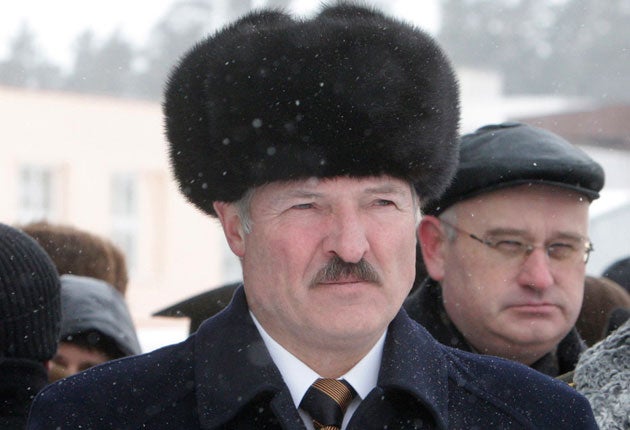How Lukashenko's Soviet-style regime maintains its iron grip

Your support helps us to tell the story
From reproductive rights to climate change to Big Tech, The Independent is on the ground when the story is developing. Whether it's investigating the financials of Elon Musk's pro-Trump PAC or producing our latest documentary, 'The A Word', which shines a light on the American women fighting for reproductive rights, we know how important it is to parse out the facts from the messaging.
At such a critical moment in US history, we need reporters on the ground. Your donation allows us to keep sending journalists to speak to both sides of the story.
The Independent is trusted by Americans across the entire political spectrum. And unlike many other quality news outlets, we choose not to lock Americans out of our reporting and analysis with paywalls. We believe quality journalism should be available to everyone, paid for by those who can afford it.
Your support makes all the difference.Alexander Lukashenko rules Europe's last dictatorship with a vice-like grip that has tolerated little opposition for the past 16 years.
When democratic revolutions swept through the former Soviet republics of Eastern Europe in the early 1990s, Belarus steadfastly took a different path.
In many ways the country mimicked the Soviets states of central Asia, where local strongmen seized power and crushed any democratic opposition to create brutal police states dominated by bizarre personality cults.
Supporters of Mr Lukashenko say he has managed to shelter Belarus from the terrible economic upheavals that neighbours such as Ukraine and Moldova went through following the collapse of the Soviet Union. But the price for such stability has been at a huge cost to personal liberty, with Belarus described as the worst human rights abuser and least democratic country in Europe.
By the time the Soviet Union fell apart, Mr Lukashenko had risen from being a humble soldier to a state farm director and then a deputy in Belarus' Supreme Council. He gained a popular following with eloquent speeches against corruption and, after independence, chaired a committee that accused 70 senior government officials, including the pro-reform leader Stanislav Shushkievich, of being on the take.
In 1994 he won the presidential election and quickly set about ensuring he would win all further elections. Two years later he pushed through a referendum that greatly expanded his presidential powers and was condemned by European nations and the United States as a step towards legalised dictatorship. Since then Mr Lukashenko has yet to hold an election that has been deemed fair by international standards.
Last year's presidential elections were, by Belarusian standards, a step in the right direction with comparatively free campaigning and a string of opposition candidates allowed to run. But the crackdown and mass arrests, that began within hours of the results being announced, has shown how little progress has been made.
Europe's response has largely been restricted to placing visa travel bans on Mr Lukashenko and the regime's leaders. Financial incentives have also been provided to hold more open elections. But it is clear that the Belarus government has been happy to give up on investment incentives from the EU in favour of shoring up support domestically by cracking down on domestic opposition.
Join our commenting forum
Join thought-provoking conversations, follow other Independent readers and see their replies
Comments